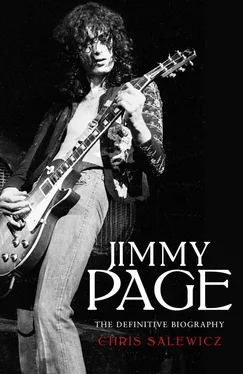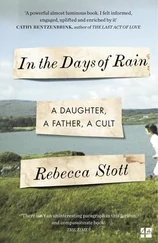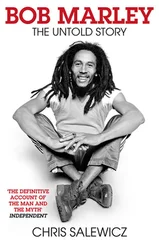‘I’ll tell you something about Jimmy Page,’ Ray Davies told Creem magazine. ‘Jimmy Page thinks he was the first person in the world to ever put a B string where a G string should be. And for me, that’s his only claim to fame. Other than that, I think he’s an asshole … Jimmy Page and a lot of other people subsequently came to our sessions when we became hot, and I think he played rhythm 12-string on “I’m a Lover Not a Fighter”, and he played tambourine on “Long Tall Shorty”.’
In fact, Page did not ‘put a B string where a G string should be’. He told Melody Maker that he would substitute the B string with a top E. Rather than the conventional E string he would swap it for a banjo octave string, either tuned to G or A: ‘You’ll get a raving, authentic blues sound that you hear on most pop records with that string-bending sound.’
‘I didn’t really do that much on the Kinks records,’ Page later admitted. ‘I know I managed to get a couple of riffs in on their album, but I can’t really remember. I know that Ray didn’t really approve of my presence. The Kinks just didn’t want me around when they were recording. It was Shel Talmy’s idea. One aspect of being in the studio while potential hits were being made was the press – too many writers were making a big fuss about the use of session men. Obviously I wasn’t saying anything to the press but it just leaked out … and that sort of thing often led to considerable bad feeling.’
For most of these sessions Page employed a Gibson Les Paul Custom, with the frets filed down ‘to produce a very smooth playing action … it just sounded so pure and fantastic,’ he told John Tobler and Stuart Grundy for BBC’s Radio 1.
Despite the griping of Ray Davies and Billy Harrison, Page played on a number of records that were significant cornerstones of mid-sixties British pop – outright classics, some of them. These included Shirley Bassey’s theme song for Goldfinger , the third James Bond film, on which he played with Big Jim Sullivan and Vic Flick, another renowned UK session guitarist – the tune was a Top 10 US hit. Then there was Tom Jones’s ‘It’s Not Unusual’, number one in the UK and Top Ten in the US; Petula Clark’s ‘Downtown’, a US number one; Kathy Kirby’s ‘Secret Love’; Marianne Faithfull’s ‘As Tears Go By’; P. J. Proby’s ‘Hold Me’; the Merseys’ ‘Sorrow’, covered by David Bowie on his Pin Ups album; the Nashville Teens’ ‘Tobacco Road’; Brian Poole and the Tremeloes’ ‘Candy Man’; Twinkle’s ‘Terry’, a motorcycle-death record in the tradition of the Shangri-Las’ ‘Leader of the Pack’ that was number four in the UK charts at Christmas 1964 and banned by the BBC for being in ‘poor taste’; ‘Baby What’s Wrong’ and its B-side ‘Be a Sect Maniac’, the first single from the Downliners Sect, a wild R&B outfit who made the Pretty Things seem like Cliff Richard.
As it had been with Bert Berns, much of Page’s session work was for the Decca label, at their studios in Broadhurst Gardens, West Hampstead, a plain, nondescript building, built like an office block.
He worked extensively with Dave Berry, a Decca solo star from Sheffield whose first hit had been a cover of his namesake Chuck Berry’s ‘Memphis Tennessee’. He was one of British rock ’n’ roll’s first anti-heroes, a true original. ‘I noticed how strippers used to tease the audience in Hamburg,’ he said of his time playing the circuit in the German port. So almost an entire Dave Berry set might consist of him singing his songs from behind the stage curtain, with only his microphone and hand tantalisingly visible.
When Elvis Presley covered Arthur Crudup’s ‘My Baby Left Me’, Scotty Moore’s guitar licks had proved such an inspiration for the teenage Jimmy Page. Now Page took the lead guitar part himself on Dave Berry’s sensational version of the song, with – as was customary – Big Jim Sullivan on rhythm.
Berry’s ‘My Baby Left Me’ only grazed the Top 40, but his sultry ‘The Crying Game’ was a Top 5 tune when it was released in July 1964. However, this time it was Big Jim Sullivan who took the lead part, with Page providing rhythm; on drums, as per usual, was Bobby Graham. There was a picture in the music press, recalled Berry, of Page standing next to him, along with the engineer Glyn Johns, listening to a playback of ‘The Crying Game’. ‘Many of the session musicians would have left as soon as they had done their part,’ said Berry. ‘But Jimmy Page, being a proper player, would listen to his own part. He would sometimes want to do it again. Mind you, at the time Jimmy was in Carter-Lewis and the Southerners: by 5 p.m. he’d be gone to do a gig.’
The specific session players he used, said Berry, ‘were really into it. I must have done a quarter of my career with Decca with that line-up: 25 to 30 songs. Mike Smith would call me with the studio booked. But if Big Jim and Jimmy Page were not available we’d cancel it and wait.’ There were at least four tracks on which Page played harmonica: ‘C.C. Rider’, for example, and Buster Brown’s ‘Fannie Mae’, which relies on a harmonica riff. Meanwhile, Page played both lead guitar and the harmonica part on ‘Don’t Gimme No Lip Child’, the B-side of ‘The Crying Game’.
Was Page, who was only 20 years old, anxious to impose his personality in the studio? Not at all, said Berry: ‘He was very quiet. The true professional players don’t have any edge to them anyway. The bigger the artist, the less edge they have to them. These two guitarists were really great players. And they didn’t stick to how this stuff was written out. Big Jim would be improvising his solo. You could hear him doing a vocal counter-melody. We’d say, “Leave that in, it’s real.” You could work with these guys and suggest things. In 2010, when I met him again, Jimmy seemed exactly the same – a normal and quiet person. I was very proud of my output: it had a vast range. So when Jimmy Page was in the biggest band in the world I was very proud of my association with them. When I’d meet up with him I’d feel very proud, like a child.’
On 27 March 1964 Page played heavy fuzz-tone guitar on Carter and Lewis’s ‘Skinny Minnie’.
By now this was becoming customary practice for the guitarist. Again, in early 1964, on a session for Screaming Lord Sutch and the Savages, Page augmented his guitar with his Gibson Maestro Fuzz-Tone on a single that was released in October that year, ‘Dracula’s Daughter’, and its B-side ‘Come Back Baby’, a studio date engineered by the legendary Joe Meek in his tiny Holloway Road set-up. (David Sutch, as his name was registered at birth, was an eccentric English rocker who appeared onstage in a coffin, sometimes dressed as Jack the Ripper – also the title of an earlier Decca single on which Page played – and based his act on the American Screamin’ Jay Hawkins, who had written and recorded ‘I Put a Spell on You’. Sutch’s Savages proved a fertile training ground, employing – among many others – guitarists Jeff Beck and Ritchie Blackmore and drummer Carlo Little, who had played briefly with the Rolling Stones prior to Charlie Watts. In 1963 Sutch stood as a candidate in a UK by-election, representing the Monster Raving Loony Party, the beginning of a career as a perennially unsuccessful Parliamentary candidate. Later, in 1964, Sutch founded Radio Sutch, a pirate broadcaster based in a wartime fort near the Thames estuary. Before the decade was out, Lord Sutch would reappear in the life of Jimmy Page.)
In September 1964 Decca Records paid for the dynamic, soulful American singer Brenda Lee, who was signed to the label, to come to London to record at Broadhurst Gardens. ‘She said to me, “I’ve come here to make a record with the British sound.” She felt she wouldn’t get the same sound in Nashville because they’re only just catching up on the British beat group sound of about six months ago,’ said producer Mickie Most to Rolling Stone magazine.
Читать дальше












